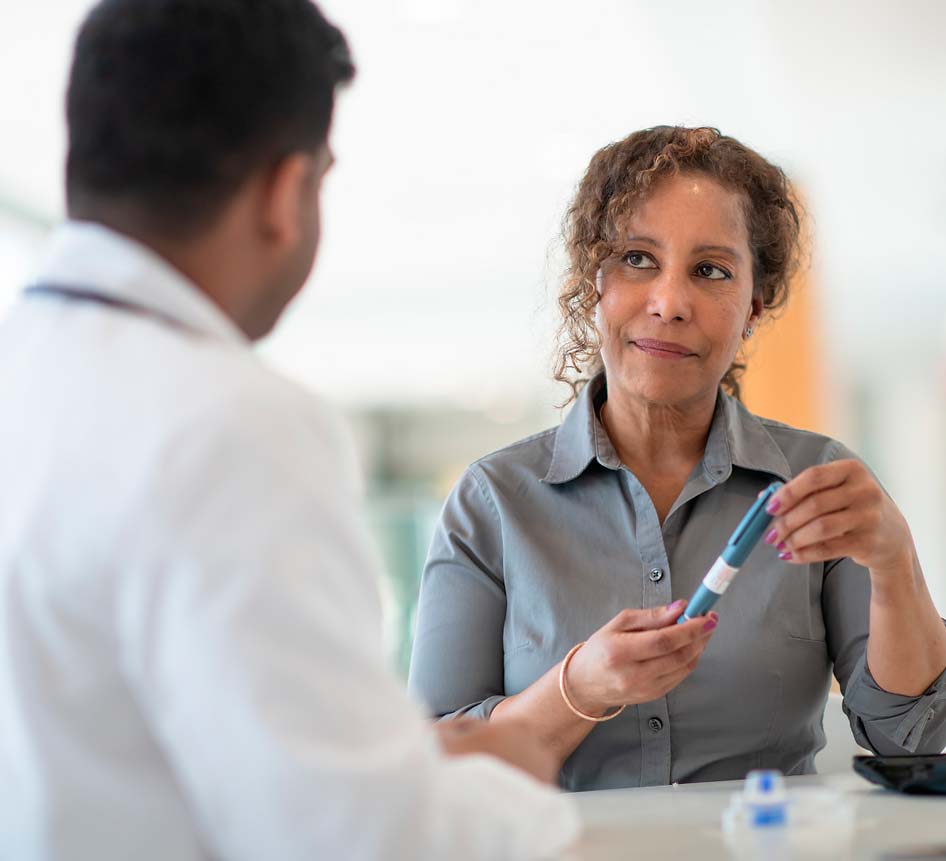
What is Diabetes?
Type 2 Diabetes is a chronic disease where the body has trouble processing the sugar in the diet, resulting in high blood sugar levels. Diabetes develops because the body gets worn down overtime from trying to process large amounts of sugar. Diabetes is very common in the United States. This chronic disease is important to control because very high blood sugar damages the body from the inside out, and can lead to complications such as heart disease, kidney disease, nerve damage, blindness, and dental issues. Thankfully, diabetes can be controlled.
We have three main tools to control diabetes
1. Medication – Your health care provider will help decide which type of medication is best for you. Diabetic medications work in different ways, but all have the same goal of lowering the amount of sugar in your blood. It is important to take your medications exactly as prescribed.
2. Nutrition – Eating a healthy, balanced diet is essential for controlling diabetes. One food group we really want to pay attention to is carbohydrates. Carbohydrates are molecules of sugar found in many of our foods and beverages. Some carbohydrates or carbs are better than others because of the way they absorb into our bodies. In addition, some foods are higher in carbs, these can increase your blood sugars. Carbs can naturally occur in our food, or they can be added into processed foods in the form of sugar. There are two main categories of carbs: simple and complex. Simple carbs are absorbed faster which raises blood sugar levels accordingly. These are found in very sugary beverages (soda/fruit juice/sweet tea), sweets, white bread/pasta, white rice, tortillas, and more. Complex carbs are a better option because they help manage your blood sugar levels, however they will still raise your blood sugar. These carbs can be found in whole grain products such as brown rice, whole wheat bread/tortillas, and legumes/beans. It is important to limit your carbohydrates to ¼ of the plate and choose the complex carbohydrates when possible.
a. See our “Nutrition” tab for more information on portion sizes, healthy recipes, and foods that will help you manage your diabetes best.
3. Exercise – Exercise is great for your overall health and helps to control your diabetes. Exercise burns sugar, lowering your blood sugar. Aim for 30 minutes of exercise five times a week (walking, jogging, swimming, biking, lifting weights, Zumba, water aerobics, hiking, etc).
a. TIP: Going for just a 5-minute walk after a meal helps prevent a blood sugar spike.

General Diabetes Care Tips
1. A1c check every 3 months. You can get this bloodwork done when you see your primary care provider. Your a1c is a 3-month average of your blood sugar. The goal for diabetics is to keep your A1c below 7.0%. Your provider will adjust your medications based off your A1c result.
2. Diabetic Foot Care. Diabetes can damage the nerves in your feet, meaning you might not feel it if you have sores, cuts, or ulcers. Wash and dry your feet thoroughly every day, wear socks with shoes, and check for any cuts or sores daily. Inform your doctor immediately if you find one.
3. Diabetic Eye Care. High blood sugar can damage the blood vessels in your eye, leading to blurry vision or even blindness. It is important for diabetics to get their eyes checked for diabetic retinopathy once per year. Our clinics host quarterly eye screenings for our uninsured diabetic patients.
